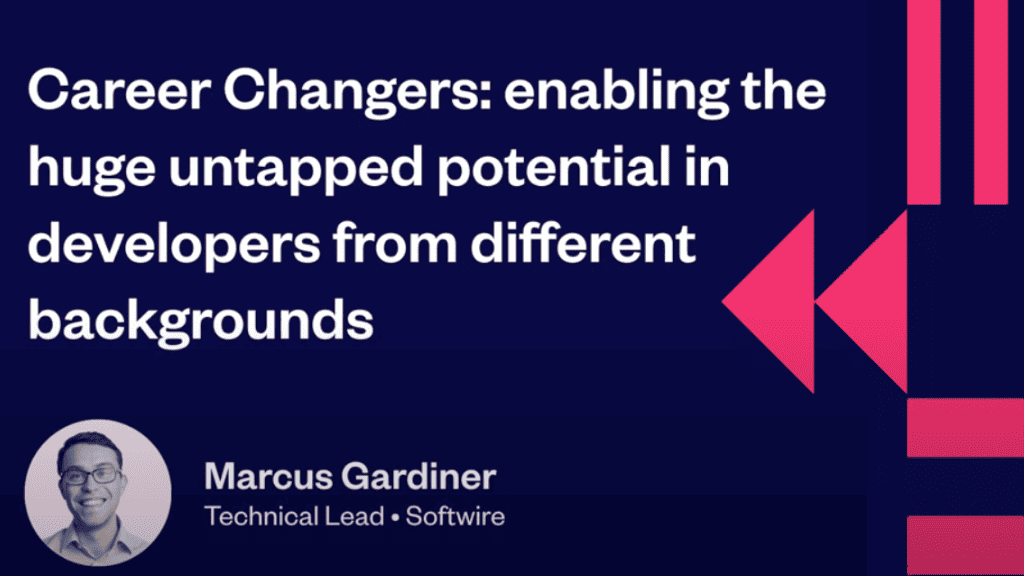
Marcus Gardiner is Softwire’s Technical Lead. He recently gave an insightful talk at LeadDev conference, exploring the world of career-switching in the tech industry. Here, he shares his own experiences, offering practical advice for companies seeking to tap into this diverse and underutilised talent pool.
It’s no secret that there’s both a shortage of talent, and a lack of diversity, in the tech sector. 40% of tech companies admit to having trouble attracting and retaining key talent, and just 21% of employees in the UK tech workforce are women.
The good news is that there’s a largely untapped talent pool, representing an opportunity to hire some exceptional people from a diverse range of backgrounds: career-changers.
Get practical advice on hiring and nurturing career-changers
Career-switching was the subject of my talk at engineering management and leadership conference LeadDev. I outlined my own career-change journey, and gave some practical advice for organisations looking to hire and nurture career-changers.
Make yourself a cuppa and watch the talk below (11 minutes), where you’ll also find the transcript.
Looking to hire career-changers?
And if you’re an organisation keen to hire career-changers into tech roles, have a chat to our sister company, TechSwitch. They run coding bootcamps, with graduates going on to take permanent tech roles with TechSwitch hiring partners.
Transcript of Marcus Gardiner’s career-change talk at LeadDev
[music]
Hello, everyone. All right. I know you don’t trust me yet, but I’m going to ask you to do something a little bit painful. I want you to imagine yourself at 15. Come on, close your eyes if you need to. The school pressures, the social pressures. Would you trust your 15-year-old self to make critical life decisions for you now? I’ve got hard proof. I would not. I really would not. I didn’t realise the picture [of 15-year-old me on the conference stage screen] would be this big, but what is this guy doing? Look at his jeans. I don’t think I’d let him pick a pair of jeans for me. Yet this is when a lot of us choose our careers.
We make those subject decisions, but there is career-changing. That isn’t without its challenges though. I remember going to a burger place here in London, GBK, with my dad. He looked at me in the eyes and he said, “Son, I’m really proud of you. You’ve taken this business consultancy career. You’re leading teams now.” I had to look back at him and say, “Yes, dad, I’m going to leave that career. I’ll probably go unpaid for a fair while. I’m doing something called a software development bootcamp.” I don’t know what your parents are like. Wasn’t the easiest conversation and I’m attempting to not relive it now.
That’s when I realised that the hard part about career-changing is that we all have this ego, self-identity of ourselves in our careers. Everybody else gets used to it. Career-changing means going through the humbling process of deconstructing that. It’s not easy.
You fast-forward a few years. I’m now working at Softwire as a technical lead for a range of clients. Most recently, the BBC, who are so nice to work with. There were a few here [from the BBC] earlier and they’ve moved back [in the conference auditorium]. I can’t see them and get nervous.
But when you fast-forward these few years, you don’t really see that ego reduction, that deconstruction process.
If that helps get you in the mindset of a career-changer, why should all of you care about career-changers? If I convince you that you should, how should you recruit them? How should you nurture them?
The starting reason for why is pretty obvious. We are in a ‘war for talent’, as you’ve heard. Bain [& Company] goes as far as to say it is a ‘matter of survival’. Pretty dramatic, but not unfounded. 40% of software engineering hires are now hired by non-technology companies. The dynamics of this are changing.
What do Bain suggest? They suggest finding creative ways to widen funnels. Don’t worry, I was a business consultant too. I can translate it for you a little bit. What they’re saying is hire career-changers: people from alternative career backgrounds, and then you teach them the tech.
This isn’t the only angle of course. When we look at UCAS statistics for university computer science courses, 16% of offers accepted were accepted by women. 16% is a vanishingly small number. If we’re going to resolve that challenge that exists in our industry, in this room, probably at your organisation, you’re going to have to attack that problem lots of different ways. Career-changers can be one. At Softwire, over the past three years, we’ve hired about an even number of grads and career-changers. 33% of our grads have been female. 66% of our career-changers have been female. Bolstered by our sister bootcamp TechSwitch, which has a 77% female graduation rate.
It’s beyond a moral imperative, though. For the cold-hearted of you in the room today, there is also a business imperative.
When BCG and the Technical University of Munich studied diversity and those factors, and their link to innovation, revenue from new products, new services, they found that what mattered were things such as gender, career path, industry background. Career-changer: tick, tick, tick.
If that intrigues you about career-changers, how do you go about recruiting them? The first bit is to understand the pathways they come from. There are four pathways in general. University study, self-study, and the increasingly popular bootcamps and apprenticeships. Bootcamps are two- to four-month courses, pretty intensive, often funded by the student, led by the student. They can also be funded by an employer recruitment fee or a bit of a combination.
Apprenticeships are a different set-up, more recent. They’re funded by the government levy. People join for 18 to 24 months as a salaried employee, and importantly – there’s a misconception here – it is for people of all ages, despite the word apprenticeship.
Who provides these bootcamps and apprenticeships? The history is interesting. This is an ad from 1968 for a software development bootcamp [displays advert on screen]. The most recent tranche, though, started in 2011. There’s been a particular proliferation since 2018, particularly across the UK. This has driven down prices, driven up quality, but there is a little bit of a mix still, of course.
From these pathways, how do you recruit? How do we recruit in general? Who’s had an experience a little bit like Sebastián here? I’ll give you a second to read it.
[Puts screenshot of a 2020 social media post on screen, from Sebastián Ramírez (@tiangolo), which reads:
I saw a job post the other day. 👔
It required 4+ years of experience in FastAPI. 🤦♂️
I couldn’t apply as I only have 1.5+ years of experience since I created that thing. 😅
Maybe it’s time to re-evaluate that “years of experience = skill level”.♻️ ]
It actually never gets old for me. In reality, in general, with recruitment, we start with a job spec, we screen based on that job spec, and intrinsically, that excludes career-changers, because they have alternative forms of experience.
We need to move to a fundamental change. Recruiting for motivation, for drive, and for potential. That starts with our tech tests. Do not overburden them with computer science and mathematical concepts, because that’s a really great test of what someone learned on their computer science degree.
When it comes to recruitment policy, have a percentage target in your entry-level hires towards career-changers. Have hiring relationships with some of these [bootcamp] providers. Go to their graduation days, their careers fairs.
In general, make sure you’re outputting a welcoming approach to career-changers. If I logged on to your careers website now, and I was a career-changer, would it welcome me, or would it just talk about grads?
If you’re lucky enough to have a career-changer join you, how do you nurture them? As a manager, it starts with meeting them where they are. A career-changer has had a successful career, bootstrapped themselves into a change, had that conversation with their parents and everyone else, and now has a new job. Pretty nice. Do not treat them exactly the same as a fresh-faced grad. It will not land. In general, you can expect them to know how to work in a team, how to get things done in an organisation. What they will want your help with is a protected technical focus, especially if you are tempted to lean into their other skills a bit too soon.
Beyond that, you can help them with the ghost that haunts our industry. I’m talking about imposter syndrome, which affects up to 80% of us. This is felt particularly keenly by career-changers.
We, I, do not have a story of, “I was six years old, I picked up this language and this book.” It doesn’t exist for me. Imposter syndrome results. In general, for career-changers, it can manifest as a feeling of, “I am not technical enough.”
Let’s break that down. What does that mean? It means I need some specific information. Help them understand the specific knowledge they need in their current specific role. The current tech stack, the current project, so they don’t get bamboozled by the broad range of things they could learn. Help them understand that this is a career about asking questions, not a career about having answers. That’s why we all live on Stack Overflow.
A final step in terms of nurturing them is organisational level. As an organisation, ensure that you go all-in. Buddies are great, but a cohort of career-changers with a shared experience is that much better. Ensure you don’t exclude them from things. Sounds obvious, but a lot of the organizations I’ve spoken to tend to have career-changers join as contractors, and for some organisations that means no training resources, no socials, not that fun.
Career-changers: a motivated, driven source of talent. You have to recruit them differently, and you have to nurture them differently.
We have heard an awesome range of ideas here [at LeadDev conference] over the last couple of days. There is an elephant in the room there. I think I saw it, is it? No, no. It’s not there. It’s in here. There’s been a lot of elephants in the room over the last 48 hours. It’s that everyone in the room is in the war for talent. We are all in competition with each other when it comes to talent. Everybody’s recruiting. As I once did, this morning, someone who’s career-changing woke up, their mind’s spinning, head exploding with code.
The only question is, will they soon be working in your team? That’s it for me. Thank you very much.
[music]
ENDS


